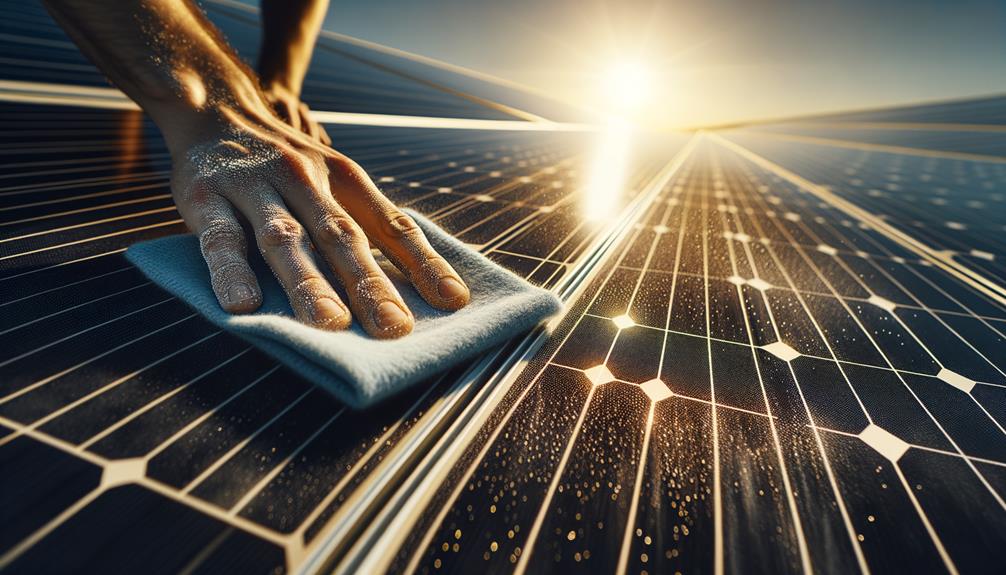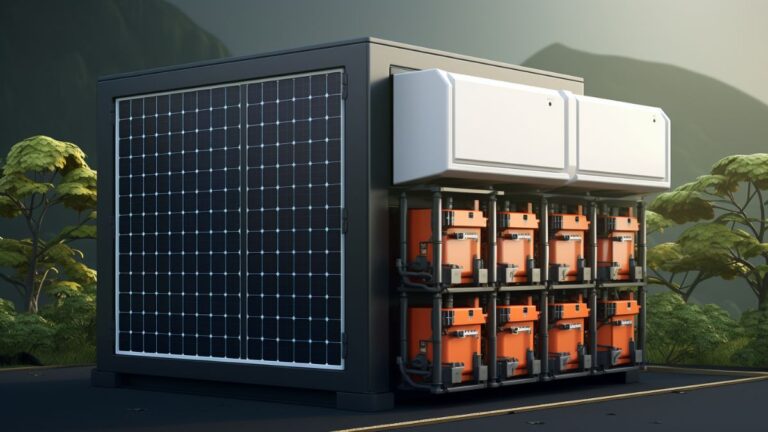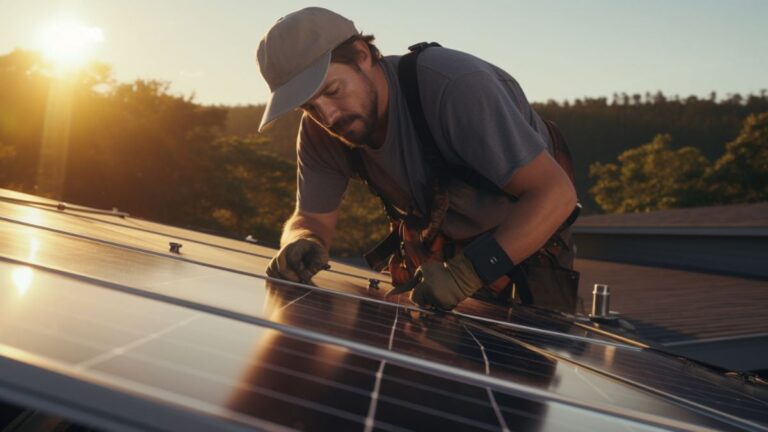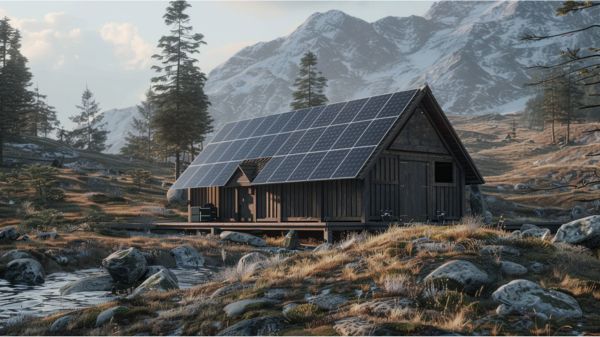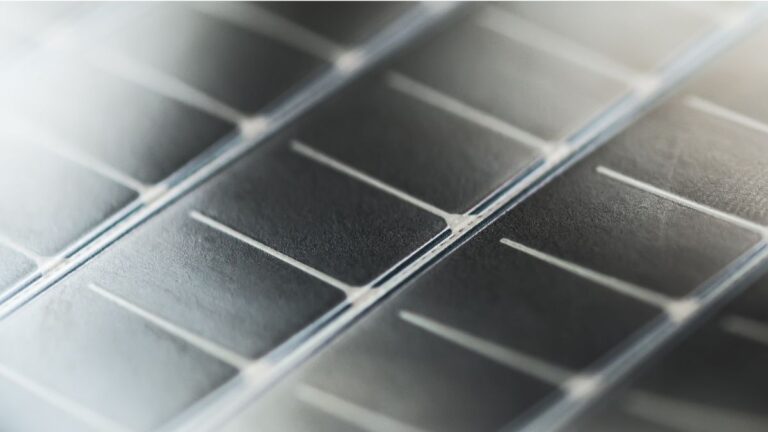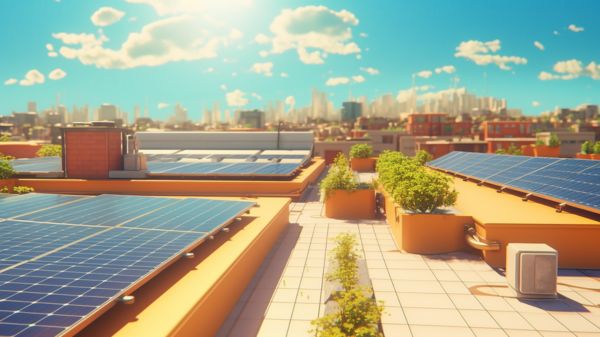15 Essential Tips for Your Off-Grid Solar Systems Maintenance
Imagine your off-grid solar system is like a well-oiled machine, quietly humming along, generating clean and reliable energy. But just like any machine, it requires regular maintenance to keep it running smoothly and efficiently. So, what are the essential tips for off-grid solar systems maintenance that will keep your system in top shape? Well, keep reading to find out!
In this article we’ll be discussing about 15 crucial tips that will ensure the longevity and optimal performance of your solar system. By following these maintenance tips, you can ensure that your off-grid solar system continues to operate efficiently and provide you with clean, reliable energy for years to come.
Key Takeaways
- Regular inspections and monitoring are essential to ensure the functionality and efficiency of off-grid solar systems.
- Cleaning and maintenance of solar panels are necessary to remove dust, dirt, and debris and maximize their performance.
- Battery care and maintenance, including checking battery levels and ensuring proper ventilation, are crucial for optimal battery performance.
- System protection and weatherproofing measures, such as sealing cable connections and utilizing weatherproof enclosures, are important to prevent water ingress and damage to the system.
Regular Inspections
Regular inspections are essential for maintaining the integrity and optimal performance of your off-grid solar system. Conduct these inspections every six months to ensure the system’s functionality and address potential issues early on.
During these inspections, thoroughly examine the system for physical damage, loose connections, or corrosion. By identifying these problems promptly, you can prevent costly repairs and ensure that your system continues to operate efficiently.
Additionally, installing a monitoring system allows you to track energy production and identify drops in efficiency. This enables you to take prompt corrective action, maximizing your system’s performance.
To further optimize energy generation, keep the surroundings clear by trimming overhanging branches or foliage that may cast shadows on the solar panels, especially during peak sunlight hours.
Remember to schedule periodic professional inspections as well, as they provide a thorough assessment and expert advice for proper maintenance and repairs.
Clean Solar Panels
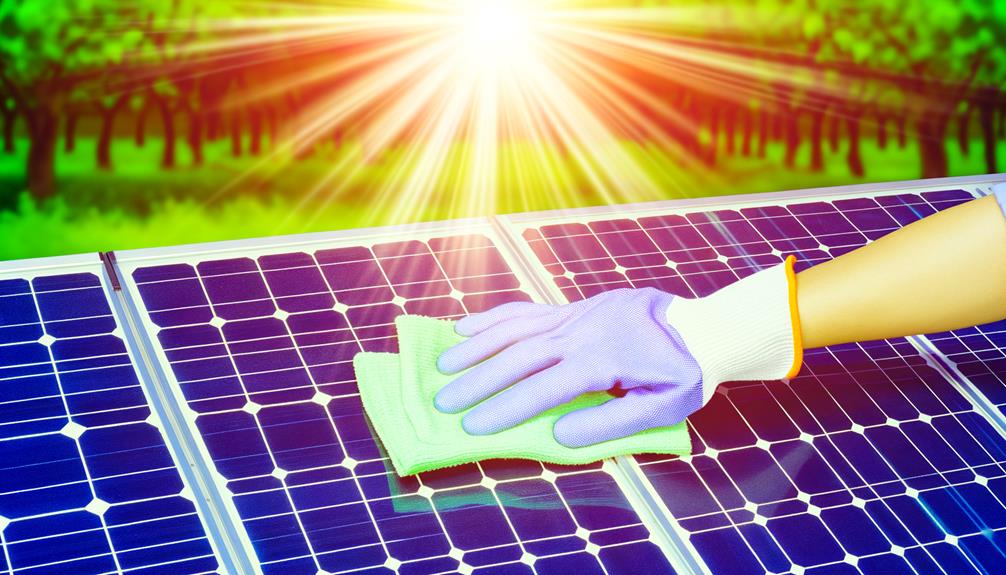
To ensure optimal performance and longevity of your off-grid solar system, maintaining clean solar panels is crucial. Regular maintenance of your solar panels is essential to ensure the efficient conversion of solar energy into electricity.
Dust, dirt, and debris can accumulate on the surface of the panels, reducing their ability to absorb sunlight and generate power. To clean your panels, use a soft brush or a gentle hose spray to remove any particles. Increase the frequency of cleaning in dry and dusty regions to maintain optimal system performance.
Avoid using harsh detergents or abrasive materials that can damage the panels. By regularly inspecting and cleaning your solar panels, you can maximize their output and contribute to the longevity of your renewable energy system.
Related Post: Cleaning Solar Panel for Its Maximum Efficiency and Sustainability.
Battery Care
When it comes to battery care in your off-grid solar system, there are a few important points to keep in mind.
- First, regularly check the battery levels to prevent overcharging or excessive discharge, which can lead to reduced battery life.
- Second, ensure proper ventilation to prevent overheating, as this can extend battery life and optimize performance.
- Lastly, avoid mixing old and new batteries to maintain consistent performance and maximize the lifespan of the battery bank.
Charging and Discharging
For optimal battery care, it’s essential to regularly monitor battery levels, ensure proper ventilation, and avoid mixing old and new batteries.
- Monitoring battery levels allows you to prevent overcharging or excessive discharge, which can damage the battery.
- Proper ventilation is crucial to prevent battery overheating, as high temperatures can significantly reduce battery life.
- Mixing old and new batteries should be avoided as it can affect the performance and lifespan of the battery bank.
- Additionally, equalizing batteries every six months helps keep all cells fully charged, ensuring consistent performance.
Checking the fluid level in flooded lead-acid batteries and topping off with distilled water as needed is also important for maintenance.
Watering and Cleaning
Regular maintenance is crucial for ensuring the longevity and efficiency of your off-grid solar system. One important aspect of battery care is watering and cleaning.
To maintain optimal performance, regularly check the fluid level in flooded lead-acid batteries and top up with distilled water as needed. Cleaning the battery terminals is also essential to prevent electrical conductivity and acid buildup.
Use a mixture of baking soda and distilled water to clean the terminals, and gently scrub with a soft brush or sponge.
Additionally, it’s important to avoid mixing old and new batteries to maintain consistent performance and extend the lifespan of the battery bank.
Monitor Performance
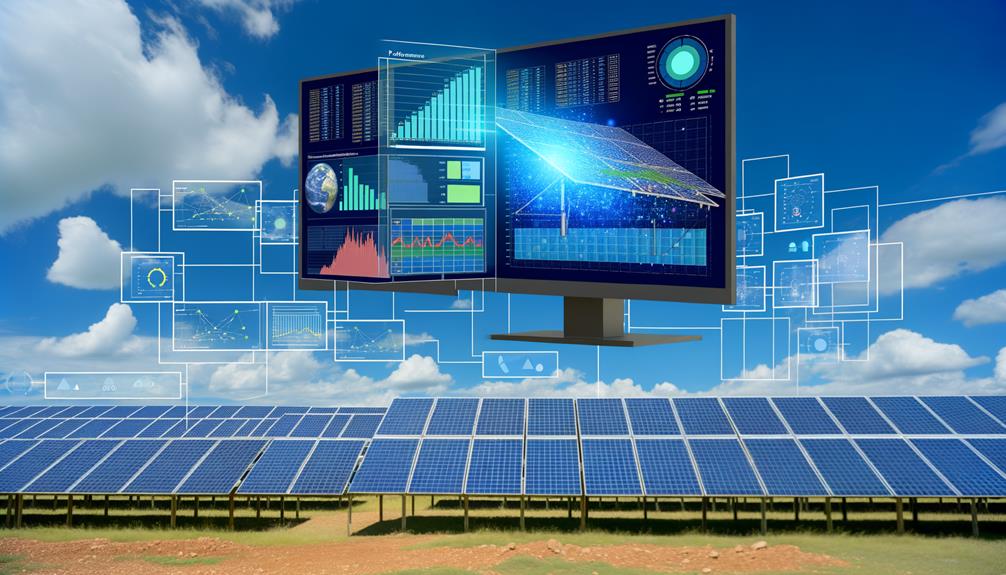
To ensure the optimal performance of your off-grid solar system, it’s crucial to regularly monitor its performance.
Install a monitoring system that tracks energy production and identifies any unusual drops in efficiency.
Utilize monitoring software or built-in systems to keep track of your system’s performance over time, allowing you to investigate and address any significant drops in energy production promptly.
Regular Performance Checks
Monitor the performance of your off-grid solar system regularly to ensure optimal efficiency and detect any deviations or trends in energy production levels. By conducting regular performance checks, you can identify any issues or inefficiencies in your system and take appropriate action to address them.
Here are five key steps to help you effectively monitor the performance of your off-grid solar system:
- Utilize monitoring software or built-in systems: Take advantage of technology that allows you to track and analyze your system’s efficiency in real-time.
- Keep records of energy production levels: Maintain a log of energy production levels and compare them over time to identify any significant drops or fluctuations.
- Promptly investigate deviations: If you notice a sudden decrease in energy production, investigate the cause promptly to prevent further issues.
- Seek professional assistance: For in-depth inspections and expert advice, consult professionals who specialize in off-grid solar systems.
- Manage vegetation and shading risks: Regularly trim nearby vegetation and monitor shading risks to ensure optimal sunlight exposure.
Data Monitoring Systems
As you continue to optimize the performance of your off-grid solar system, one crucial aspect to consider is the implementation of a data monitoring system.
This monitoring system allows you to track the energy production of your system and identify any unusual drops in efficiency. By monitoring the performance of your off-grid solar system, you can take prompt corrective action to ensure optimal performance.
This is essential for maintaining system integrity and preventing further damage that could lead to costly repairs.
With a data monitoring system in place, you can easily track energy production and identify any issues early on. By addressing these issues promptly, you can maintain the optimal performance of your off-grid solar system and ensure its longevity.
Efficiency Optimization Techniques
For efficient optimization techniques in maintaining the performance of your off-grid solar system, it’s essential to regularly monitor its functionality and energy output. By monitoring the system, you can promptly identify any drops in efficiency and take corrective action to address the issues.
To optimize the efficiency of your off-grid solar system, consider the following techniques:
- Install a monitoring system: Use monitoring software or built-in systems to track energy production and keep a record of production levels over time.
- Regularly monitor performance: Ensure optimal system functionality and energy output by consistently checking for any deviations or unusual drops in efficiency.
- Take prompt corrective action: Address any issues identified through performance monitoring immediately to prevent further decline in energy production.
- Seek professional assistance if needed: If you notice significant drops in energy production that you can’t resolve, consult a professional to investigate and resolve the problem.
- Maintain a proactive approach: Continuously monitor and optimize your off-grid solar system to ensure maximum energy output and efficiency.
Keep Surroundings Clear
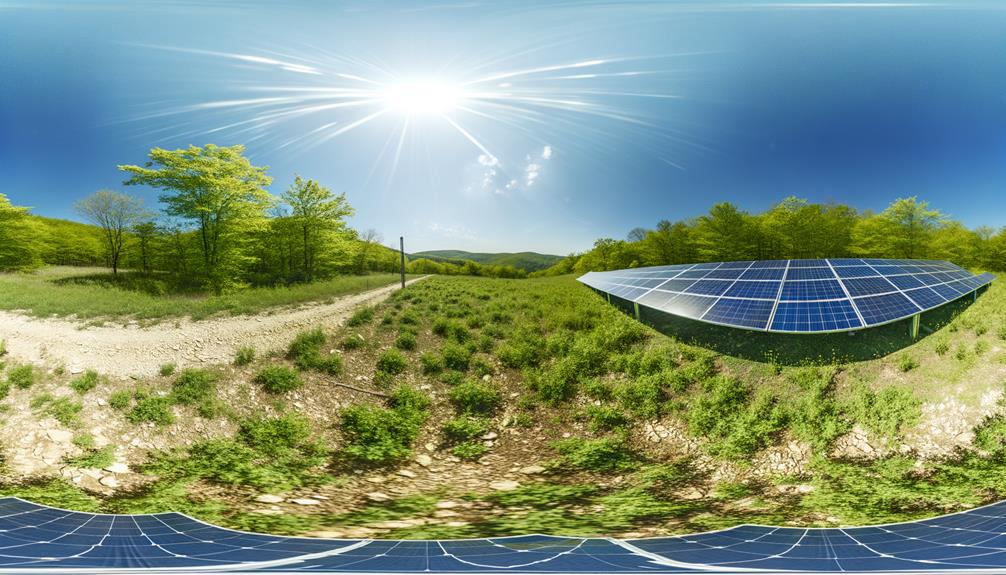
Regularly trim overhanging branches or foliage to ensure optimal energy generation and prevent shadows from reducing the efficiency of your off-grid solar system.
It’s essential to keep your surroundings clear of any obstructions that can obstruct sunlight from reaching your solar panels.
During peak sunlight hours, clearing the area around your solar panels becomes even more crucial to enhance system efficiency.
Debris and shadows can significantly impact energy generation and reduce the overall performance of your system.
By regularly cleaning the surrounding area, you can maximize energy production and prevent any potential shading issues.
Weatherproofing
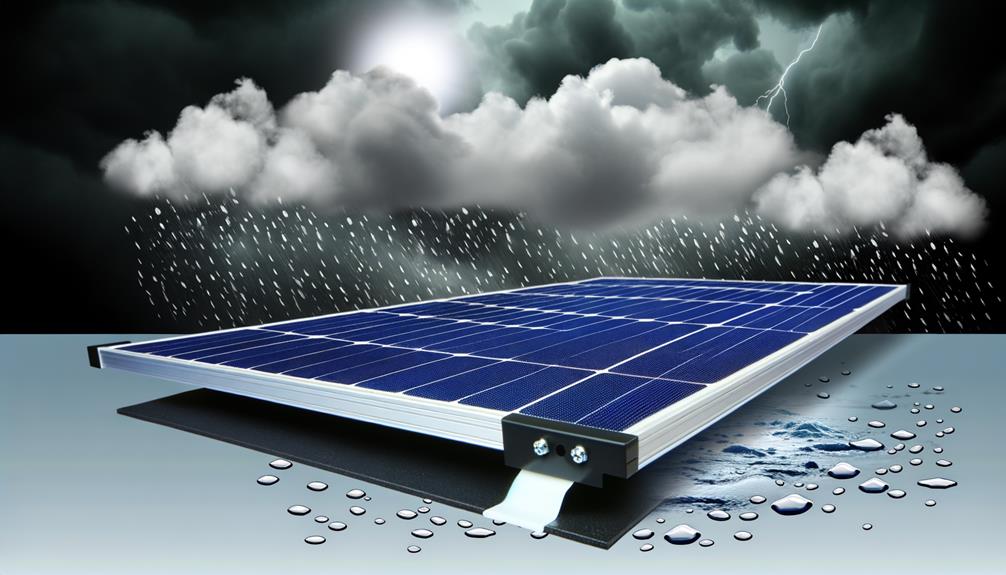
To ensure the long-term performance and efficiency of your off-grid solar system, proper weatherproofing is essential. Protecting your system from the elements will safeguard your investment and ensure uninterrupted energy production.
Here are some key weatherproofing tips to consider:
- Seal all cable connections and entry points to prevent water ingress.
- Use waterproof conduit and junction boxes to protect wiring and connections.
- Apply silicone sealant around any penetrations in the roof or walls where cables enter the building.
- Utilize weatherproof enclosures for sensitive electronic components like charge controllers and inverters.
- Install durable and weather-resistant mounting hardware for solar panels to withstand harsh weather conditions.
Controller Check
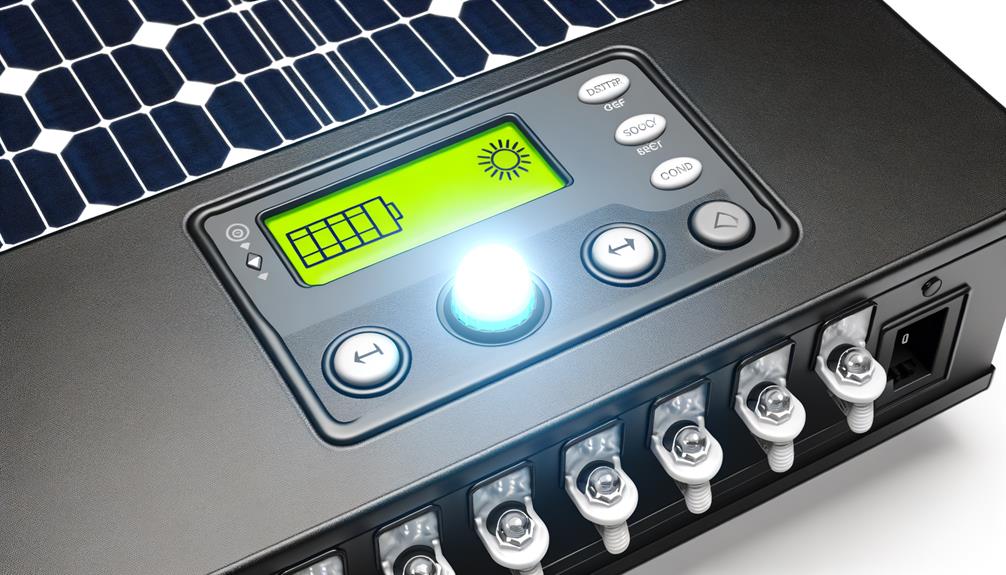
Now it’s time to focus on the controller check. To ensure optimal performance, start by checking the voltage and ampere readings on the charge controller.
Inspect the battery connection for any loose or corroded connections that can affect the system’s efficiency. Lastly, troubleshoot common issues such as controller malfunctions or error codes to identify and resolve any potential problems.
Voltage and Ampere Readings
You should regularly check the voltage and ampere readings of your solar system controller to ensure optimal performance and alignment with the recommended battery voltage. This step is crucial in maintaining the health of your off-grid solar system and maximizing energy production.
Here are some important points to consider during this maintenance task:
- Verify that the voltage readings match the recommended voltage for your battery bank.
- Ensure that the ampere readings are within the acceptable range for your solar panel systems.
- Regularly inspect the charge controller for any signs of damage or malfunction.
- Check the settings of the controller and make necessary adjustments to optimize performance.
- Keep a record of the voltage and ampere readings over time to identify any irregularities or fluctuations.
Battery Connection Inspection
Inspect the battery connections on your off-grid solar system’s charge controller regularly to ensure proper operation and optimize battery performance. This is one of the essential maintenance tasks that you need to perform to keep your solar system operating efficiently.
Begin by checking the battery terminals for any signs of corrosion or loose connections. Corrosion can hinder the flow of charge and affect the overall performance of your battery storage. Tighten any loose connections to ensure a secure and reliable connection.
Additionally, inspect the settings on your charge controller and align them with the recommended voltage for your battery type. This will prevent overcharging or excessive discharge, which can lead to decreased battery life.
Troubleshooting Common Issues
To ensure optimal performance and prevent common issues, regularly checking the charge controller on your off-grid solar system is essential. The charge controller is responsible for regulating the flow of electricity from the solar panels to the batteries, ensuring that the batteries aren’t overcharged or discharged.
Here are some maintenance tips for troubleshooting common issues with the charge controller:
- Inspect the controller regularly to ensure proper operation and prevent overcharging or excessive discharge.
- Check the settings and align them with the recommended voltage for your battery type to guarantee a smoother and safer energy transition.
- Proper maintenance of the charge controller ensures optimal performance of your off-grid solar system.
- Regularly check the fluid level in flooded lead-acid batteries and top off with distilled water for battery maintenance.
- Avoid mixing old and new batteries to maintain consistent performance and improve the efficiency and reliability of your off-grid solar system.
Related Post: Efficiency and Safety: Unveiling the Best Solar Charge Controller.
Address Dust and Grime
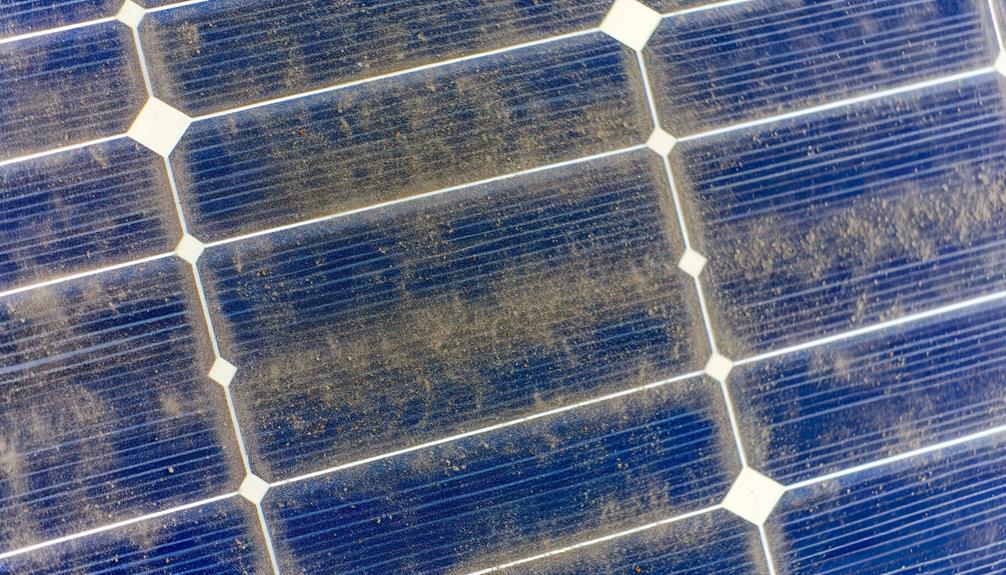
Regularly cleaning your off-grid solar panels is essential to maintain optimal performance and maximize energy output. Dust, dirt, and debris can accumulate on the panels over time, reducing their efficiency and blocking sunlight absorption.
To clean your panels, use a soft brush or a gentle hose spray to remove the accumulated dust and grime. Be cautious not to use any abrasive materials that may scratch or damage the surface of the panels.
In dry and dusty regions, it’s recommended to increase the frequency of panel cleaning to ensure they’re free from any obstruction.
Battery Water Levels
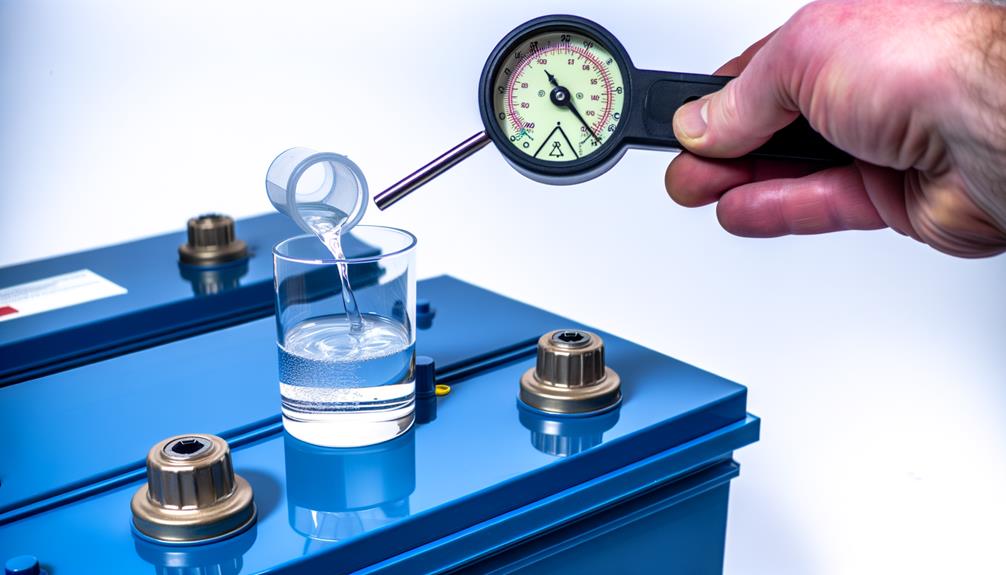
To maintain optimal performance and ensure the longevity of your off-grid solar system, it’s important to monitor and manage the water levels in your batteries. Proper maintenance of battery water levels is crucial for the efficient operation of your off-grid power system.
Here are some essential tips to help you maintain the water levels in your batteries:
- Regularly check the water levels and top off with distilled water as needed.
- Prevent overcharging or excessive discharge to maintain optimal battery performance.
- Ensure proper ventilation to prevent overheating and extend battery life.
- Use an amp-hour meter or hydrometer to measure specific gravity and voltage of the battery.
- Equalize batteries every six months to keep all cells fully charged.
Inverter Maintenance
Maintaining the inverter of your off-grid solar system is crucial for optimal performance and longevity, so it is important to regularly inspect and maintain it every six months.
The solar inverter is responsible for converting the DC power generated by the solar panels into AC power that can be used to power your appliances. To ensure your solar power system operates efficiently, you must keep the inverter free from physical damage, loose connections, and corrosion.
Regularly cleaning the inverter to remove dust, dirt, and debris is also essential. Additionally, proper ventilation and protection from extreme weather conditions are necessary to prevent overheating and damage.
By monitoring your inverter and addressing any issues early on, you can prevent costly repairs and ensure your batteries function optimally, resulting in overall energy liberation.
| Inverter Maintenance Tips | Benefits |
|---|---|
| Regular inspection and maintenance | Prevents issues and ensures longevity |
| Keep free from damage and corrosion | Maintains system integrity |
| Clean regularly | Removes dust, dirt, and debris |
| Proper ventilation and protection | Prevents overheating and damage |
Check Grounding
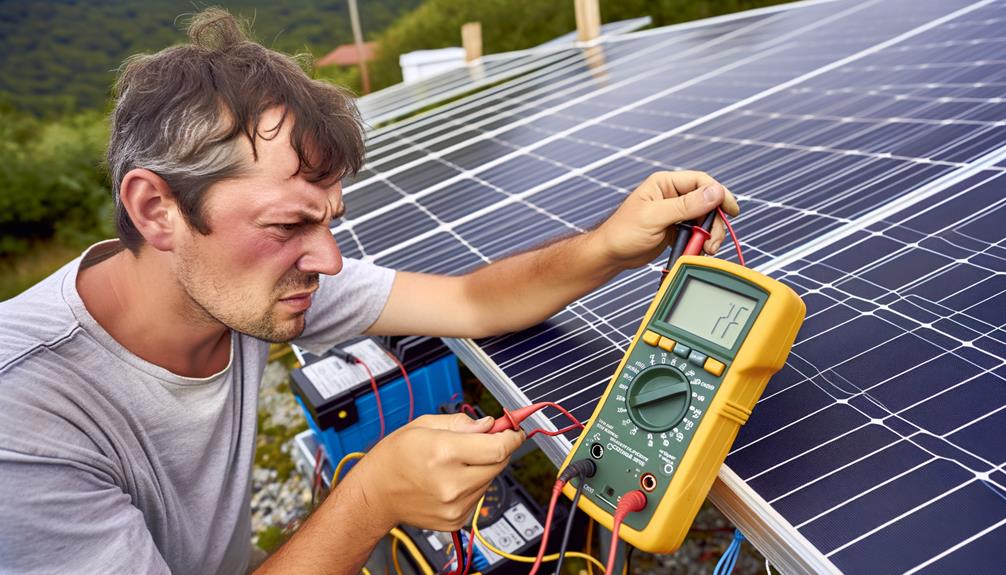
Now it’s time to delve into the importance of grounding in your off-grid solar system.
Ensuring proper grounding is crucial to maintain the safety and effectiveness of your system. Regularly inspecting the grounding system helps prevent electrical hazards and system malfunctions.
Let’s explore the significance of grounding and the checklist for inspecting it.
Grounding Importance Explained
Proper grounding plays a crucial role in ensuring the safety and optimal performance of off-grid solar systems. Here are some important points to understand the importance of grounding in off-grid solar systems:
- Protection against electrical surges: Proper grounding helps protect the system and its components from electrical surges that can occur due to lightning strikes or power fluctuations.
- Safety assurance: Grounding ensures the safety of the system by preventing electrical shocks and potential fire hazards.
- Regular maintenance: It’s essential to regularly check and maintain the grounding system to ensure its effectiveness. This includes monitoring for corrosion, loose connections, and any damage that may compromise its functionality.
- Optimal energy production: A well-grounded system helps maintain stable electrical flow, leading to better energy production and system efficiency.
- Compliance with safety standards: Proper grounding is a requirement set by safety standards to ensure the safe operation of off-grid solar systems.
Ensuring Proper Grounding
Are you ensuring that your off-grid solar system is properly grounded?
Proper grounding is essential for the long-term performance and safety of off-grid solar systems. Regularly checking the grounding of your system is crucial to ensure its integrity and functionality.
Take the time to verify that all components are properly grounded to minimize the risk of electrical hazards and malfunctions. It’s important to inspect the grounding systems for any signs of corrosion, damage, or loose connections.
Grounding Inspection Checklist
To ensure the integrity and functionality of your off-grid solar system, regularly inspect the grounding connections for any signs of physical damage or corrosion. Proper grounding is crucial for the safety and optimal performance of your system. Here is a grounding inspection checklist to help you maintain your system’s longevity and energy production:
- Ensure all grounding connections are tight and secure.
- Inspect grounding rods for proper installation and condition.
- Verify proper grounding of all system components, including solar panels, inverters, and charge controllers.
- Use a multimeter to measure the system’s grounding resistance to confirm it’s within acceptable limits.
Pest Prevention
To prevent pests from nesting or causing damage to your off-grid solar system, it’s important to take measures to seal potential entry points and install wire mesh around vulnerable areas. Regular cleaning and debris accumulation prevention are essential maintenance tips for pest prevention in off-grid solar systems.
Inspect your system regularly for signs of pest activity such as nests, droppings, or gnaw marks. Remove any debris or vegetation that could attract pests or provide hiding spots near the system.
Additionally, consider using natural repellents or deterrents to discourage pests from approaching the solar components.
Winter Preparations
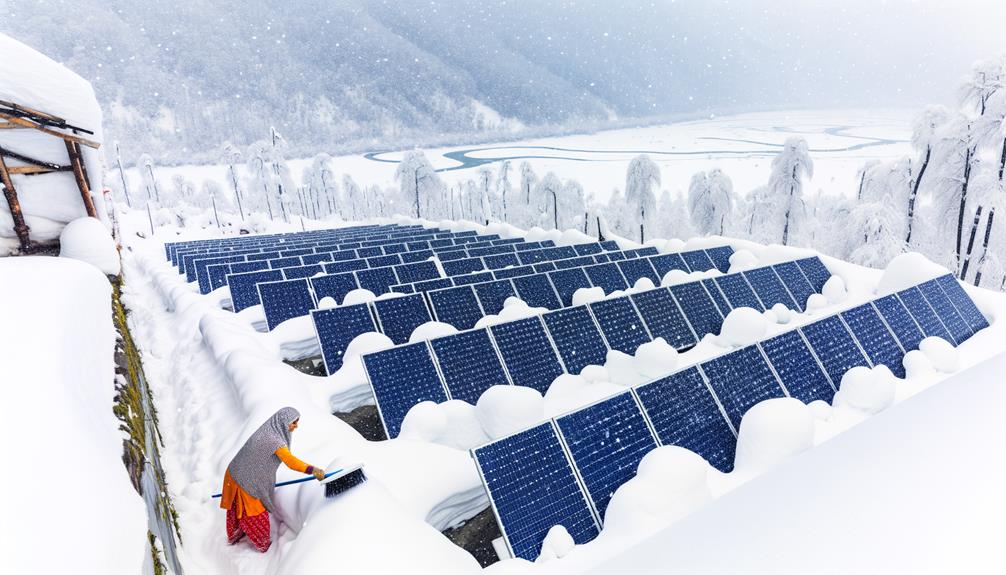
For optimal performance and protection of your off-grid solar system during winter, it’s important to take certain precautions and implement necessary preparations.
Here are five essential winter preparations to ensure efficient energy production and proper maintenance:
- Regularly check battery levels to prevent overcharging or excessive discharge during winter.
- Install angled installations in snowy regions to promote easy snow slide-off and prevent accumulation on solar panels.
- Protect the system from extreme weather by securely anchoring solar panels to prevent dislodging during strong winds or storms.
- Use shade structures or protective covers in areas with intense sun to mitigate excessive heat and protect solar components during winter.
- Install surge protectors to divert excessive currents and protect system components from potential winter electrical events.
Educate Users
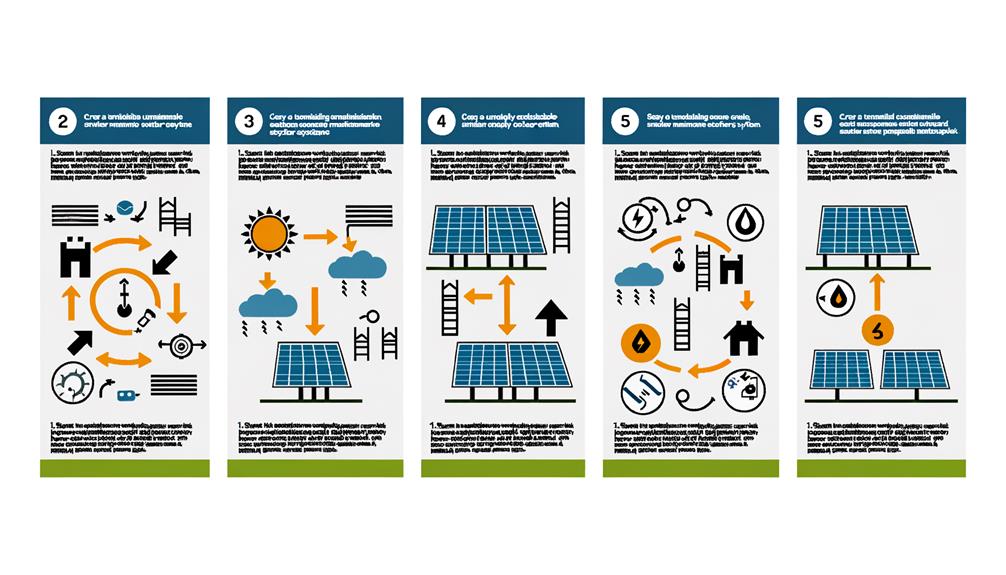
Now that you have prepared your off-grid solar system for winter, it’s crucial to educate users on proper operation and maintenance to ensure optimal performance and longevity of the system.
Providing thorough training on system operation and maintenance procedures will empower users to make the most of their sustainable energy solution. By offering guidelines for safe and efficient use of off-grid solar systems, users can minimize energy consumption and maximize the system’s capabilities.
It’s important to educate users about monitoring system performance and recognizing potential issues, as well as instructing on proper battery care and maintenance to extend the system’s lifespan. Additionally, ensuring users understand the importance of regular inspections and seeking professional assistance when needed will help maintain the system’s efficiency and reliability.
Emergency Plan
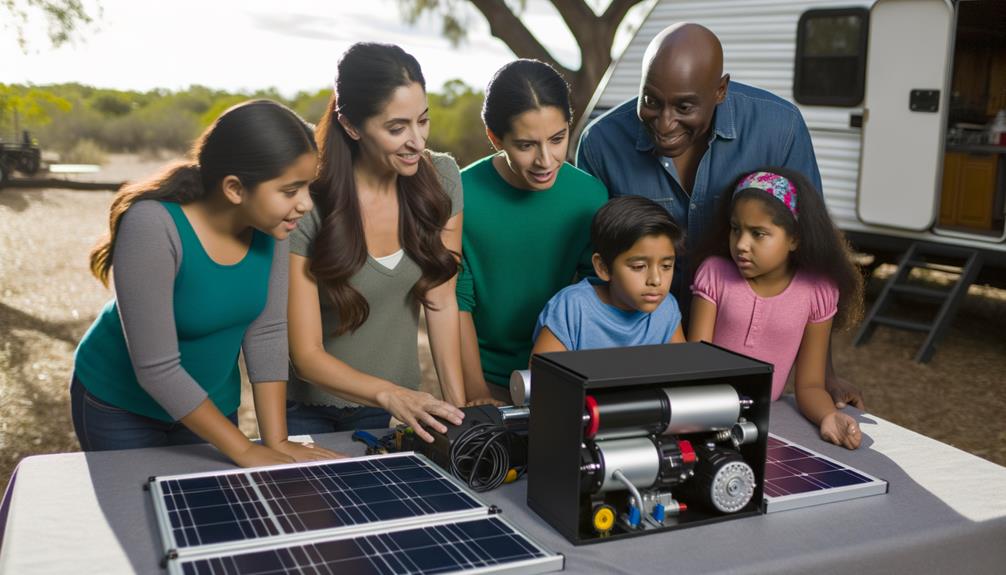
Developing a detailed emergency plan for your off-grid solar system is crucial to ensure preparedness for unexpected situations. Having a well-thought-out plan can minimize downtime and potential damages to your system.
Here are some essential items to include in your emergency plan:
- Include contact information for maintenance professionals and local authorities. This will allow for quick and efficient communication during emergencies.
- Keep backup power sources, such as generators or portable batteries, readily available. These backups will ensure continuous energy production during system failures.
- Train household members on the emergency procedures for the off-grid solar system. Familiarizing everyone with the necessary steps to take in case of an emergency will minimize confusion and ensure safety.
- Regularly review and update the emergency plan to account for any changes in your system or household. This will ensure that your plan remains relevant and effective.
- Consider consulting with professionals to develop a comprehensive emergency plan tailored to your off-grid solar system. Their expertise will help maximize the longevity and efficiency of your system.
Frequently Asked Questions
How Do You Maintain an Off-Grid Solar System?
To maintain an off-grid solar system, clean panels with a soft brush or gentle hose spray. Check battery levels and ventilation, and install a monitoring system. Keep surroundings clear for maximum energy generation. Troubleshoot common issues promptly.
What Maintenance Should Solar System Consider?
To maintain your off-grid solar system, you should regularly maintain the batteries, care for the inverter, inspect the wiring, clean the panels, and stay updated with monitoring system upgrades.
What Maintenance Is Required for Solar Panels?
To properly maintain your solar panels, regularly clean them using gentle cleaning techniques, inspect panels for any issues, weatherproof the system, maintain battery levels, and troubleshoot common problems.
What Do I Need for a Complete Off-Grid Solar System?
To have a complete off-grid solar system, you’ll need solar panels, deep-cycle batteries, an inverter, a charge controller, and the right energy management strategies. It’s crucial to have the right off-grid system design, battery storage, inverter options, charge controller selection, and energy management strategies for optimal performance.
Conclusion
Regular maintenance is crucial for the optimal performance and longevity of off-grid solar systems. By following these essential maintenance tips, you can ensure that your system operates at its best and maximizes energy output.
Did you know that solar panels can lose up to 25% of their efficiency if not regularly cleaned? Taking proper care of your system not only saves you money but also helps reduce your carbon footprint.
